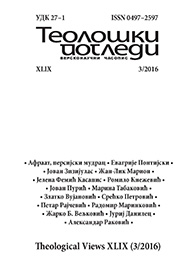Шта значи Оуреши на Милутиновој плаштаници?
What does form Оуреши mean in King Milutin’s burial shroud?
Author(s): Žarko B. VeljkovićSubject(s): History, Middle Ages, 13th to 14th Centuries, Philology
Published by: Свети Архијерејски Синод
Keywords: King Milutin; King Milutin’s burial shroud; Gračanica; King’s Church; Stefan Uroš; Milutin Ureš; Stefanos Ureš; Στέφανος Οὔρεσις
Summary/Abstract: In the Museum of Serbian Orthodox Church in Belgrade is enshrined King Milutin’s burial shroud with Serbian Slavic inscription, written in Old Church Slavic orthography: †ПОМѦNHБЄ̃ДƔШѪРАБАСВОЄГоМHЛƔТHNАƔРЄШH, translated as: (In the name of the Father, the Son and the Holy Ghost) do not forget, oh God, this soul of Your servant Milutin Ureš! In this inscription can be perceived one personal name and one titular. In this way, because King Milutin did not use officially his personal name, but titular Stefan Uroš, it is about unofficial circles close to the King. In the inscription within King Milutin’s church endowment, Monastery Gračanica, we read: СТФNО ƔРЄШЬ КРλЬ, translated as: King Stefanos Ureš. In this inscription can be seen two titular names, i. e. one full titular name and in this way it is about official context. And inscription above King Milutin’s portret in King’s Church in Hilandar is: СТЄ́Фſ҃Ν̉Є̉ΝΧΩ̃ΤΟΘΩ̃ΠΙ҆ϛΟὖРЄСІСК, translated as: Stefan, in the Body of Christ the Lord, faithful master Uroš. This article scrutinizes the Serbian Slavic form Ѹрешь as Serbianised Byzantine Greek Οὔρεσις, which is their version of Serbian domestic name Ѹрошь, and Greecized script Стефанос Ѹрешь instead of Serbian Slavic Стефань Ѹрошь is just a part of King Milutin’s introduction of Byzantine customs and institutions in Serbia of the time. Name Ѹрешь is inflected by -i- steams, i. e. as feminine substantive кокошь and maybe name of pagan godess Мокошь, but it’s masculine as the substantive Господь (Genitive -и or -а, -ⱶа). It is about a scholarly adaptation in Serbian Slavic -i- steams because Byzantine Greek Οὔρεσις belongs to Greek -i- (-ι-) steams, in which – as far as I know – is one and only masculine personal name, same as in Serbian Slavic. Аnd sound -ш- in name Ѹрешь is obviously in accordance to Serbian Slavic equivalent Ѹрошь, so the conclusion is: the name Ѹрешь is made by (formational) adaptation of Byzantine Greek equivalent name Οὔρεσις in accordance to Serbian Ѹрошь.
Journal: Теолошки погледи
- Issue Year: XLIX/2016
- Issue No: 3
- Page Range: 645-652
- Page Count: 8
- Language: Serbian, Old Slavonic

